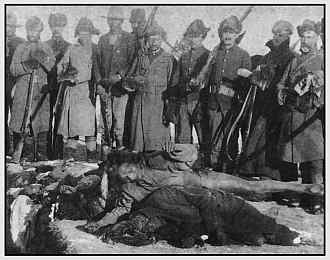In her introduction to the book, Richardson writes, “The fate of the Minneconjous at Wounded Knee was sealed by politicians a thousand or more miles from the rolling hills and cathedral clouds of the Great Plains. The soldiers who pulled the triggers in South Dakota simply delivered the sentence.”
This was obviously not written to exonerate the troops involved in the massacre, but to show how the military was used for political purposes--mostly to give settlers security, and for the economic benefit of the farmers, ranchers and merchants who supplied the troops in the field. In return, the politicians expected the votes of those same frontier beneficiaries. In the ten weeks prior to the Wounded Knee massacre, the build up of troops in the region grew to be the largest military mobilization since the Civil War. Fully one third of the U.S Army was in South Dakota and northern Nebraska to meet the shrill alarmist insistence of the corrupt Indian agents that the Sioux were massing for a major outbreak, signaled by the Ghost Dance. Richardson also explains clearly the corruption and political actions that drove the tribes to despair and desperation from which they sought hope in the Ghost Dance.
These are good points to remember when someone claims Wounded Knee or another massacre was an "accident" or rogue operation. In reality, incidents like these were the culmination of decades of anti-Indian policies promulgated by federal and state officials. These policies created an environment where massacres became thinkable, likely, even inevitable. If Wounded Knee hadn't happened, the Army would've had to invent some other slaughter to show the Indians resistance was futile.
Standard history ignores the context
The same applies to almost every Indian incident in our history. For instance, a massacre committed by Indians occurred only after they established firm territorial rights. Only after they warned settlers repeatedly to stay off their land. In that context, killing the invaders as a last resort was an understandable form of self-defense.
"Frontier justice" became necessary when white men refused to impose actual justice on their criminal behavior. When they refused to play by the rules that they themselves invented. What happened was that they violated the law and then rewrote history to make themselves the victims. They ignored the context of tribal rights and labeled the Indians "savages" and "murderers."
For a fraudulent take on Wounded Knee, see Bury My Heart at Wounded Knee: The Movie. For more on the subject, see "Balanced" View of Wounded Knee and Ghost Dances Were Peaceful.


No comments:
Post a Comment